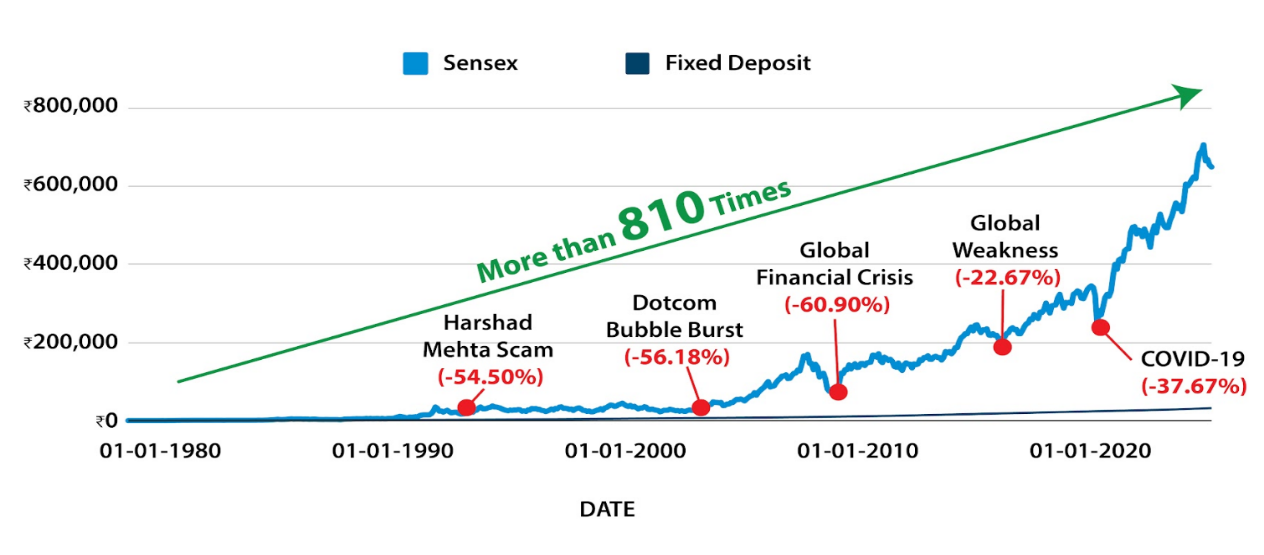Investing During Market Volatility: What You Should and Should not Do
Markets today react more quickly, and often more sharply, to global and local events than ever before. But uncertainty in markets isn’t new. It’s always been part of investing.
Even so, volatility continues to make investors uneasy. Events such as inflation, interest rate hikes, geopolitical tensions, and economic slowdowns often lead to sharp market movements. These fluctuations can test the patience and confidence of even experienced investors.
But it is important to understand: volatility brings opportunity for long-term investors when approached with discipline and perspective. Investors understanding this can stay on track even during uncertain times.
Volatility: The Market Normal
Equity markets don’t move in a straight line. They go through phases such as periods of growth, corrections, and sometimes sharp declines. While volatility may feel uncomfortable, it’s not unusual. It has always been a part of equity investing.
For example, between May 2019 and May 2025, the Nifty 50 index delivered a CAGR of 22.32%, even though it experienced multiple periods of uncertainty. The annualised volatility during this time was 14.69%, showing that short-term market movements didn’t stop long-term returns.

Source: BSE, RBI. Data for the period is 3rd April 1979 to 31st May 2025. Sensex growth is represented by the returns of Sensex Price Return Index (PRI). Average of 1 to 3 Year Fixed Deposit (FD) Rates published by RBI have been used to calculate the FD returns. The FD rates relate to that of the 5 major public sector banks up to 2003-04, post which they represent the deposit rate of the 5 major banks.The drawdown of market crashes are calculated from the 52 week high to the date of the bottom of the respective market crashes. Growth of Sensex of more than 810 times is calculated by taking base year as 1978-79 and base value as 100.
Disclaimer: Past performance may or may not be sustained in future and is not an indication of future return.
A similar pattern can be seen in the above chart. Despite various shocks, like the global financial crisis in 2008, the COVID-19 crash in 2020, and periods of inflation or geopolitical tension, markets have consistently recovered and moved upward over time.
Strategies to Navigate the Volatile Markets
Market volatility can’t be avoided, but can be managed. Instead of reacting emotionally, following a few simple strategies can help stay focused and make the most of tough market phases.
- Stay Consistent with SIPs: Systematic Investment Plans (SIPs) help investors benefit from market volatility through rupee-cost averaging, especially during market corrections. When markets fall, you end up buying more units at lower prices, which helps your average cost and builds wealth steadily without the need to time the market.
As of May 2025, monthly SIP inflows crossed ₹26,600 crore (Source: AMFI), showing rising investor confidence in systematic investing, even in volatile times.
- Focus on Quality: In volatile markets, fundamentally strong businesses with consistent earnings, low debt, and good governance tend to hold up even better. A quality-focused approach helps reduce downside risk and ensures resilience.
- Add Flexibility with Dynamic Asset Allocation: Dynamic Asset Allocation (DAA) automatically adjusts your equity-debt mix based on changing market conditions. This helps reduce equity exposure when markets are overheated and increases it when valuations are attractive, providing flexibility.
This approach helps manage risk without relying on emotional decisions and ensures that your portfolio stays aligned with broader market trends.
- Diversify Your Portfolio: Different asset classes respond differently to market events. Diversification across equity, debt, and gold helps reduce overall portfolio risk. While one part of the portfolio is down, the other may hold up better.
It’s also important to diversify within equity across sectors, market capitalizations, and investment styles. Checking the correlation between investments ensures that you're not unknowingly concentrated in similar kinds of risk.
What Not to Do During Volatile Markets
Just as there are smart ways to deal with volatility, there are also common mistakes that can hurt long-term results. Avoiding these habits can help you stay focused and protect your portfolio during uncertain times.
- Making Emotional Decisions: Fear or panic during a market dip often leads to poor timing. Selling in a downturn usually locks in losses and can cause you to miss the recovery.
- Checking Your Portfolio Too Often: Frequent portfolio checks can increase anxiety, especially during volatile periods. It’s more helpful to review and rebalance investments periodically with a long-term view, rather than reacting to short-term movements.
- Chasing What’s Trending: Jumping into the latest hot stock or sector after it’s already run up often leads to disappointment and usually increases risk.
NJ Mutual Fund’s Investment Approach
At NJ Mutual Fund, we follow a 100% rule-based, quality-focused investment approach. With low overlap across strategies and a strong emphasis on true-to-label portfolios, we aim to deliver clarity, conviction, and long-term wealth creation while removing emotions from the investment process. To know more, visit njmutualfund.com
Conclusion
Volatility is part of the investing process, but how you respond to it makes all the difference. Staying disciplined, avoiding emotional decisions, and following a strategy suited to your goals can help you navigate the uncertain phases with confidence.
Because compounding doesn’t reward perfection, it rewards patience and discipline, even when the markets don’t stay still.
FAQs
1) What are the different ways to navigate volatile markets?
SIPs, diversification across assets and sectors, investing in quality companies, and dynamic asset allocation are effective ways to manage risk during volatility.
2) How can I stay disciplined when markets are falling?
Continue your SIPs. SIPs help you invest regularly, benefit from rupee-cost averaging, and stay invested without trying to time the market, keeping emotions out of the process, and staying disciplined.
3) How to stay invested in volatile markets?
Volatility is normal and often creates opportunities. Focusing on long-term goals, avoiding reacting emotionally, and continuing with regular investments like SIPs can help stay invested and confident.
« Previous Next »